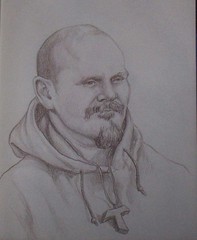Tuesday, November 15, 2005
Jesus' Yoga (originally posted 10/6/05)

Today's reading comes from the 11th chapter of the Gospel of St. Matthew, verses 28-30:
"Come to me, all you who are tired out and carrying burdens, and I will give you rest. Take my yoke upon you, and learn from me, for I am genial and meek in my heart, and you will find rest in your souls. For my yoke is very pleasant, and my burden is light."
It is interesting, and very revealing to examine the root of the word "Yoke." A Yoke is the large wooden harness that is used to tie an ox or a buffalo to a cart or plough that they might do work for their master. So, here, The Master is saying that becoming His oxen, his workers, is an easy burden. This may seem at odds with other places in the Gospels and Epistles, where we are told that to be a disciple of Christ is to be rejected by society, to be spit upon. The whole of the Catholic faith seems sometimes constructed upon the foundation of the correctness of suffering. What then, is Jesus saying here?
The "lightness" The Master speaks of is a lightness of the Spirit, an inner serenity. It is interesting to note that the English word "yoke" is a derivative of the Sanskrit word "Yoga" (Sanskrit being the oldest surviving language in the Indo-European language family). Yoga means "to tie or hook together," and as we have said before, a yoke is a tool for attaching a load to work animals. In order to gain the deeper understanding of The Master's words, then, it is useful to know WHAT "binding" is implied in the term Yoga. While we in the West tend to think of Yoga as a bunch of stretching exercises like an Indian calisthenics or something, this physical Yoga, or HATHA Yoga, is only one aspect of a whole system of philosophy, meditation, and postures which are designed to bind the Soul of the individual to God. This is nearly identical to the analogy Christ makes in another part of the Gospel where he speaks of the Kingdom of Heaven as a wedding, where He is the Groom and the Human Soul the Bride.
The deeper meaning of this passage, then is that once we bind ourselves to Christ; once our consciousness is wedded to His, all our burdens (our stresses, emotional considerations, our responsibilities in the world) will become light and easy. Even this so-called suffering, which is considered a hallmark of the Christian life, will seem like nothing at all, and we will be able to bare it easily and without worry or stress. Christ is telling us that when we bind ourselves to His Consciousness, we are lifted up to a state of mind beyond worry and weight to a place of Serenity, Light, and equanimity.
<< Home

